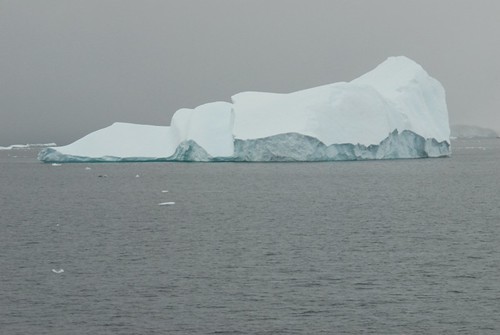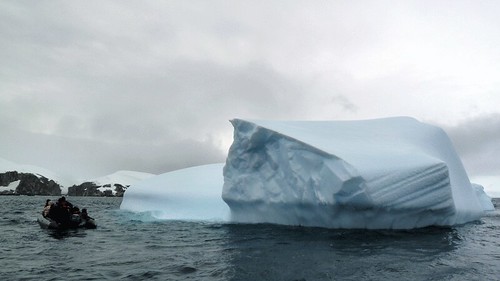a·maze·ment
/əˈmeɪzmənt/ [uh-meyz-muhnt]
–noun
1. overwhelming surprise or astonishment.
2. Obsolete.
a. stupefaction; frenzy.
b. perplexity.
c. consternation.
“You’re going to need to new adjectives.” This is (again) Dennis Mense, a veteran Antarctic expedition leader to me, prior to my trip south. He was right, and I hear him again, in my head, often, as people ask me that terrifying and expected question: “So, how was your trip?” “It was amazing,” I say, feeling like an idiot. The thesaurus gives me some other words. Awe, marvel, wonder. “Every day was a wonderland,” I wrote, in the abbreviated slide deck I shared with my friends and family far away.
A wonderland, I wrote, like Alice experienced when she fell down the hole and opened the door with that tiny key. Like me, she had to go a long way to get there, though my rabbit hole was airworld, shiny and full of chain stores and mediocre coffee. My garden was made of ice and instead of a rabbit in a waistcoat, I had birds in tuxedos. Magical creatures in shiny pelts, speckled, flippered floating on icy blue pedestals. It would be better, maybe, to write fiction, a fairy tale about an enchanted land at the very end of the planet, a curvy white place carved by water, the blue parts occupied by barnacled giants with pale white on the undersides of their fins and flukes.
Amazing, I say, over and over. I was amazed, in the true definition of that word, I was utterly overwhelmed by the beauty of that pale blue. “Is that really the color?” Friends ask this when I show them the pictures. “It’s really blue like that?” I didn’t use filters, I didn’t fuss with the pictures in PhotoShop. “It’s really that blue.” I say. “Iceberg blue.” They are confounded by the blue.
Science explains it, but it still doesn’t make sense, and it makes less sense when you look at the place where the ice meets the water. There is a line, a pale line where the ice hits the water, and then a kind of jade color, and turquoise, and it’s clear, the water is too clear, like you could step out of the Zodiac on to dry ground. “What is that color?” I asked myself, over and over. It’s a blue glass bottle in the sunshine, or a Chagall window, or a showcase of Chinese jade jewelry.”It was amazing,” I say, “the color was unbelievable,” still feeling hopelessly weak at description.
How do you write about places that knock the words right out of you? Slowly, I am a trying slowly, in tiny bites. I have been wading through my photos, they help me remember things in manageable pieces. Penguins, of course, the first time I stood on the beach with them, and the last time, when we were companionable old friends who didn’t need to talk. Seals, barking on the dirty snow, scratching with their flippers, looking a little flea-bitten when they’re dry and you’re that close. The snouts of humpback whales, bobbing along the starboard side of the ship, looking, looking, with such a curious human eye, then circling to the other side of the ship to see if maybe it’s different from there. And ice, in color, transparent and opaque, scalloped and ridged from water, clear as glass, or that iceberg blue.
“Did it seem like enough time? Was it always interesting?” Every single day, I say. The specifics were the same, but I was always — there it is again — amazed. We’d go 12 hours without seeing penguins and then, we’d go to shore, and I would be giddy with amusement and glee over the site of penguins. There was ice every day, every day, we’d pass towering blue glaciers or through a cocktail glass of ice cubes or I’d weave through a collection of sculpted blocks on the beach and I’d stop and stare. “I was constantly amazed.” I said, meaning it, meaning not nearly enough.
To write about Antarctica, I take it apart into tiny pieces, ice, penguins, seals, water, sky. They’re still too big. But if I think, the sky was pewter, like a flat metal tray, then I can say something that makes sense, that means something beyond “I was amazed.” The sky was pewter, tarnished metal, and all around me, were fat little Buddha penguins, in black and white, welcoming me. And ice, blue, that blue. It really was that color.
It’s a start.
My trip to Antarctica was organized and paid for by TravelWild. I’m writing about my adventures on their site, too. Go read.



Amazing. (OK, maybe your readers will need some new adjectives too). This is such beautiful writing and I can’t wait to hear the bits and pieces as they come.
Wonderful post as usual. Sometimes words wont do justice to what you have experience no matter how well you write. But the combination and words and pictures sometimes clear things up.
This post is completely full of extra-hot awesome sauce. I especially liked the line, “How do you write about places that knock the words right out of you?”
It always bugs me when a writer says that something is “beyond words.” You are a writer! You have to capture it in words. That’s your job! You’ve managed to write a beautiful essay that says “beyond words” in the best way possible. I wasn’t sure it could be done. You did it.
Under our watch, from now on, anyone who uses the phrase “it was indescribable” is FIRED.
Thank you, Kelsey. Extra-hot awesome sauce from YOU is high praise. Habanero style.
This post was so beautifully written, you actually have me sold on going to Antarctica. (This coming from a person who hates when it drops below 50 degrees.) I agree with Kelsey in that you have made “beyond words” something more than “I can’t think of how to describe it” (not an easy task, for sure). I can not even imagine what it is like to get that close to penguins. They are such fascinating little creatures. I can’t wait to hear more about your trip!
What a stunning travel narrative!
Pam, I am coming to this in the wrong order, but I do think there is a book of verbal snapshots in you. Something like the guy who did the book of very, very short stories. Because this is extraordinary and very moving writing. But, whadda I know?!
Love what you did with not having any words to describe, and I agree that “amazing” needs to better used than it is today.
BTW, any pictures of the penguins? I think it would be cool to be surrounded by penguins. What a cool adventure.
OMG!.. Sooo amazing sights! First thing on my mind when talking about Antarctica is the ice. I couldn’t stand it. My country doesn’t have a snow ever.